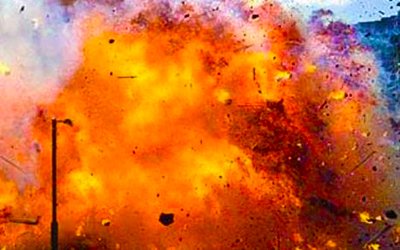Thiruvananthapuram, Sep 7: A crude bomb was hurled at a BJP office in the heart of the city in Thiruvananthapuram, with the party alleging that CPI(M) workers were behind the attack. No one was injured in the incident, police said.
 The incident occurred around midnight on Wednesday, shortly after BJP State president Kummanam Rajasekharan had left the office for Kozhikode, where preparations are on for the three-day National Executive and Council meeting from September 23, which is being attended by senior party leaders and Prime Minister Narendra Modi, party sources said.
The incident occurred around midnight on Wednesday, shortly after BJP State president Kummanam Rajasekharan had left the office for Kozhikode, where preparations are on for the three-day National Executive and Council meeting from September 23, which is being attended by senior party leaders and Prime Minister Narendra Modi, party sources said.
At least four workers were on the top floor of the building, housing the office, when the bomb was hurled.
Though no one was injured, glass panes of the main entrance door were damaged in the incident, Thiruvananthapuram City Police Commissioner S. Sparjan Kumar said.
The incident comes close on the heels of a series of sporadic clashes between the CPI(M) and BJP workers in the past few months in northern Kannur district.
Mr. Rajasekharan alleged that CPI(M), the lead partner of the ruling LDF in Kerala, had taken law into its hands and police was a “mere spectator”.
“Violence of the CPI(M) is increasing each day. A BJP activist was hacked to death in Kannur recently and CPI(M) is behind it,” he said at Kozhikode.
“Despite so many incidents, CPI(M) leaders and Chief Minister Pinarayi Vijayan, who is also holding the Home portfolio, have not condemned the series of attacks against BJP and its workers,” he added.
BJP leaders P.K. Krishnadas and M.T. Ramesh slammed the CPI(M), saying the bomb attack against the party office should not be seen as an “isolated” incident.
“This is a calculated and well planned attack against the BJP and CPI(M) is behind it,” they said. All flex boards in front of the office were also destroyed, Mr. Krishnadas said.
Television channels telecast a CCTV video footage showing a man riding a motorcycle minutes before the blast and police are on the lookout for him.














Comments
I am sure that this is done by BJP to get benefit
May be BJP itself had carried out this attack and blaming CPI....they had done it before too....and blamed Muslims.....
Add new comment